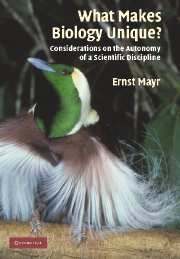Book contents
- Frontmatter
- Contents
- Preface
- Acknowledgments
- Introduction
- 1 Science and sciences
- 2 The autonomy of biology
- 3 Teleology
- 4 Analysis or reductionism?
- 5 Darwin's influence on modern thought
- 6 Darwin's five theories of evolution
- 7 Maturation of Darwinism
- 8 Selection
- 9 Do Thomas Kuhn's scientific revolutions take place?
- 10 Another look at the species problem
- 11 The origin of humans
- 12 Are we alone in this vast universe?
- Glossary
- Index
- References
11 - The origin of humans
Published online by Cambridge University Press: 10 December 2009
- Frontmatter
- Contents
- Preface
- Acknowledgments
- Introduction
- 1 Science and sciences
- 2 The autonomy of biology
- 3 Teleology
- 4 Analysis or reductionism?
- 5 Darwin's influence on modern thought
- 6 Darwin's five theories of evolution
- 7 Maturation of Darwinism
- 8 Selection
- 9 Do Thomas Kuhn's scientific revolutions take place?
- 10 Another look at the species problem
- 11 The origin of humans
- 12 Are we alone in this vast universe?
- Glossary
- Index
- References
Summary
The study of the evolution of human ancestors is at present in considerable turmoil, after a period of some forty or fifty years of relative stability. What is the cause of this current uncertainty? It seems that three different factors are primarily responsible: the recent discovery of five or six new kinds of hominid fossils, a more consistent application of geographic thinking to the ordering of hominid taxa, and the appreciation of the importance of climatic changes for the evolution of hominids. These facts lead to a reevaluation of much of the fossil evidence and to a good deal of healthy and largely unresolved controversy. My aim here is to provide a somewhat speculative report of my own reinterpretation of human prehistory.
An age of typology
Traditionally the study of hominid evolution was fostered by physical anthropologists who had received their training as human anatomists, most often in Germany. Their philosophy was idealistic morphology, the traditional conceptual framework of the anatomists. For them every fossil was a new type and often it was given a new name and, if it seemed to be at all truly distinct, it was even placed in a new genus. Geographic races of Homo erectus were described as different genera, Pithecanthropus (Java) and Sinanthropis (China). One historian in the 1930s listed more than thirty generic and more than one hundred specific names for fossil species of hominids.
- Type
- Chapter
- Information
- What Makes Biology Unique?Considerations on the Autonomy of a Scientific Discipline, pp. 195 - 208Publisher: Cambridge University PressPrint publication year: 2004

